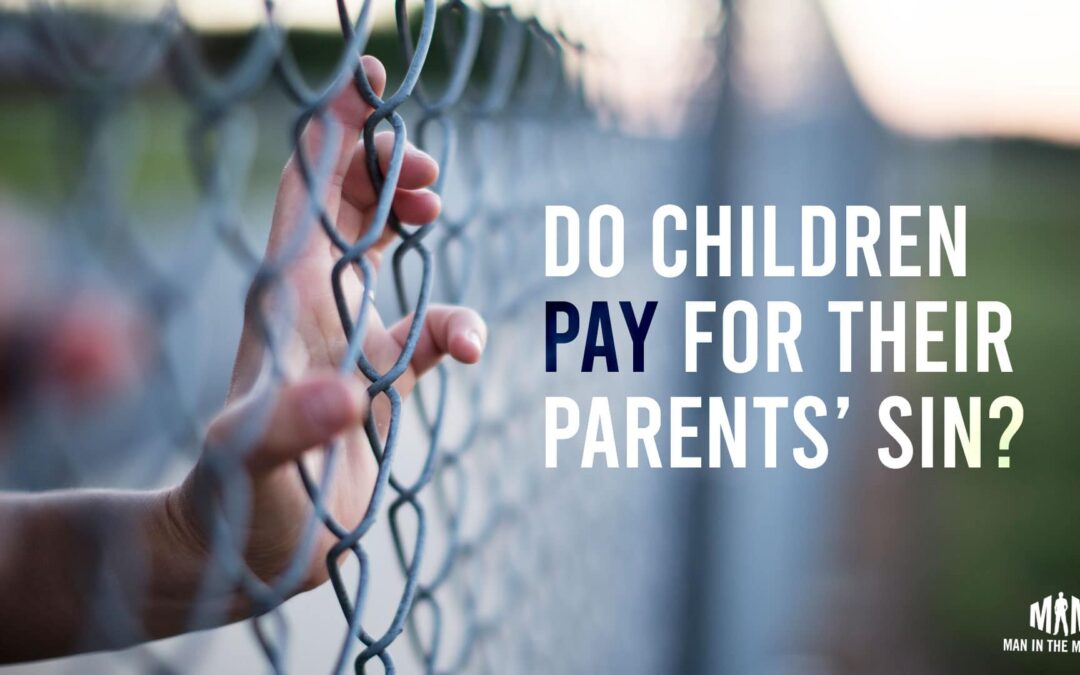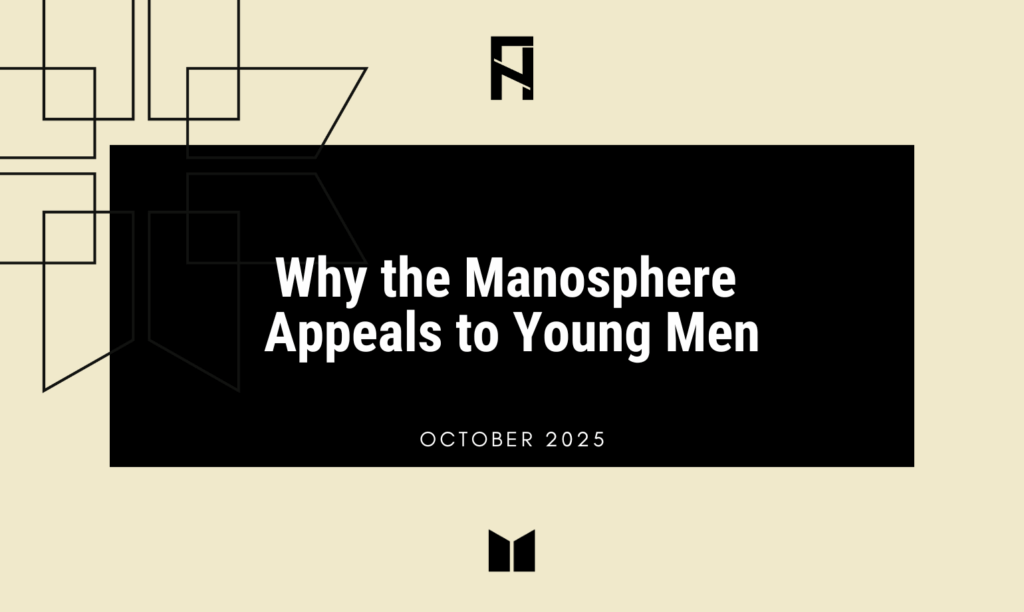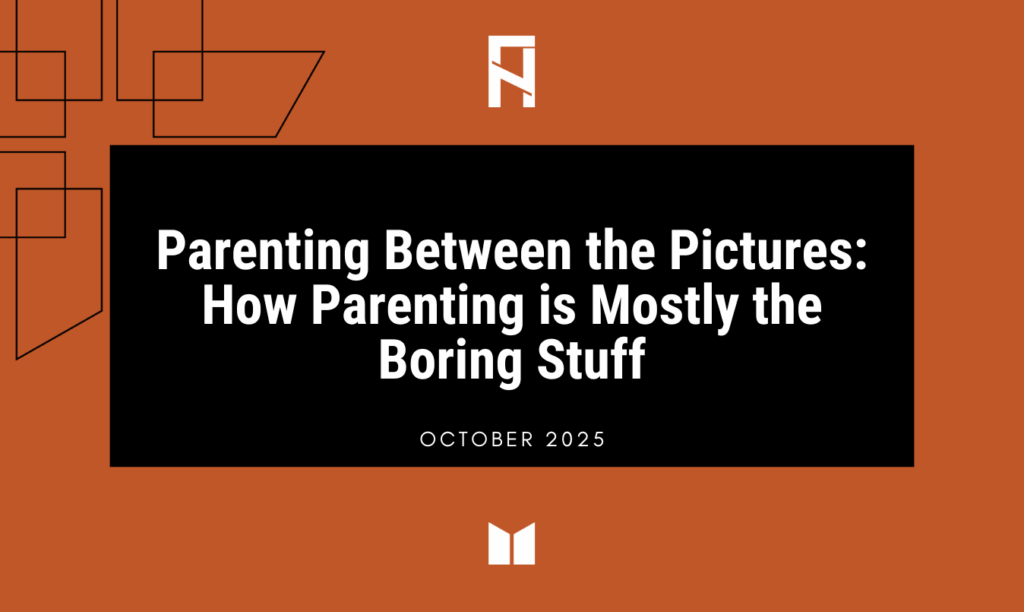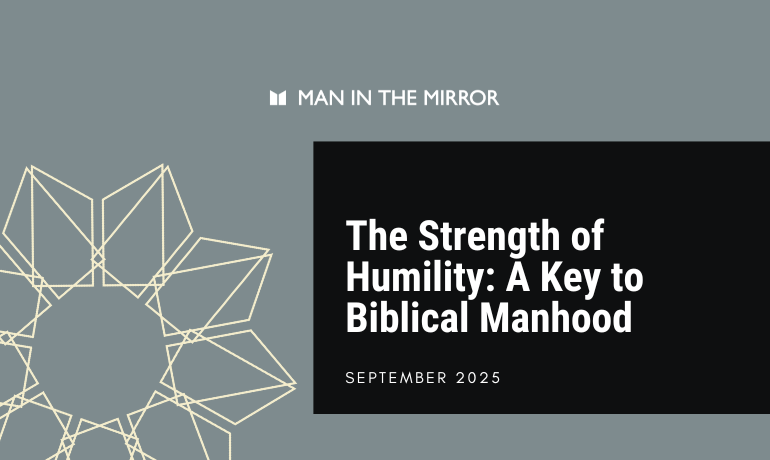Are you paying for your father’s sins? Will your children have to pay for your sins? Here’s what the Bible has to say about the subject, along with five applications for discipling men.

By Patrick Morley
Man in the Mirror Founder
Winter Park, Florida
Do children pay for their parents’ sins? More personally, will your children have to pay for your sins? There is a lot of talk in the church about “generational” curses, and many men are asking themselves questions like these.
The second of the 10 Commandments says:
“You shall not bow down to (idols) or worship them; for I, the LORD your God, am a jealous God, punishing the children for the sin of the fathers to the third and fourth generation of those who hate me, but showing love to a thousand generations of those who love me and keep my commandments.” (Deuteronomy 5:9-10, NIV) (Note: Where the NIV says “punishing,” the King James Version says “visiting.”)
Because of this verse, I myself spent many years wondering, Am I being punished for the sins of my grandfathers and great grandfathers?
I also have spent a lot of time wondering, Will my children and their children suffer for my sins?
Perhaps you, too, have puzzled over these issues. Here’s what the Bible has to say about the subject.
The Bible is clear that children absolutely do suffer for their parents’ sins (notice the nuanced wording of the New International Version compared to the New Living Translation):
You show unfailing love to thousands, but you also bring the consequences of one generation’s sin upon the next. (Jeremiah 32:18a, NLT)
You show love to thousands but bring the punishment for the parents’ sins into the laps of their children after them. (Jeremiah 32:18a, NIV)
All you have to do to verify this is watch an episode of Dr. Phil or another daytime talk show. Dysfunctional, sinful, and sometimes evil fathers and mothers do leave emotional scars that can hamstring a child for life.
It’s also clear, however, that children do not pay for their parents’ sins:
Parents are not to be put to death for their children, nor children put to death for their parents; each will die for their own sin.” (2 Chronicles 25:4b, NIV)
What does this mean to a leader trying to disciple men?
There are five applications if you are ministering to men:
1) As leaders, let’s make sure our men understand they are not being held accountable for the sins of their parents, even if they are suffering because of those sins. A man who never felt his father’s love and approval, for example, is not responsible for his father’s sin, even though it hurts.
2) As a deterrent to sinful behavior, let’s make sure our men understand that when they sin (e.g., commit adultery, abuse alcohol, or seek an unbiblical divorce), their children will indeed suffer for their sins. For example, a young woman once told me, “When my father deserted us, I didn’t just lose my dad. I lost my mom, too, because she had to work two jobs and I hardly ever saw her.” The impact on this young woman has been lifelong.
3) Let’s encourage men to confess the sins of their parents (e.g., racism, abuse, neglect, dishonesty). It is biblical to do so:
And the Israelites separated themselves from all foreigners and stood and confessed their sins and the iniquities of their fathers. (Nehemiah 9:2, ESV)
But if they will confess their sins and the sins of their ancestors—their unfaithfulness and hostility toward me… (Leviticus 26:40, NIV)
4) Let’s encourage men to ask God for mercy to be released from any bondage resulting from their parents’ sins. In the psalms, David prayed:
“Do not hold against us the sins of past generations; may your mercy come quickly to meet us, for we are in desperate need.” (Psalm 79:8, NIV)
5) Let’s encourage men to forgive their parents. Forgiveness doesn’t always mean reconciliation of the relationship, but a lack of forgiveness will stunt their own progress—emotionally and more importantly, spiritually. Immediately after the Lord’s Prayer, Jesus said:
For if you forgive other people when they sin against you, your heavenly Father will also forgive you. But if you do not forgive others their sins, your Father will not forgive your sins. (Matthew 6:14-15, NIV)
The bottom line is this: Yes, as children we do suffer for our parents’ sins, but we are not responsible for their sins. We don’t “pay” for the sins of our parents. We each stand alone before God. We each need a Redeemer and Savior of our own.
THE BIG IDEA: We may suffer for the sins of our parents, but we are not responsible for them. We can use this truth to help men confess, forgive, and grow.
*This article was originally published in 2005 by Man in the Mirror.
♦♦♦
[vc_widget_sidebar sidebar_id=”businesslounge-free-2″]







it’s called “Generational Curses”…once we accept Jesus as personal savior, the sins are forgiven, and, during our spiritual growth we can also “break those generational curses” , so our next generations (our children) will not have those consequences…
Thank you Victor. You are often in my prayers. Pat
I’m looking for information about why Elijah prophesies against Ahab in 1st Kings (?) then Ahab puts on sack cloth and fasts so God changes His mind and decides not to kill Ahab but instead his sons?
Thanks for connecting Bryn. A close reading of the verses that follow the text you’re asking about show that Ahab’s repentance was short-lived, and he was eventually killed for his evil.
Also, the text does not actually say the sons would be killed but that He would bring disaster on Ahab’s house in the days of his son—possibly meaning death, and probably, but not necessarily.
As it happened, Ahab’s son Ahaziah was also evil and lasted only two years. Since Ahaziah has no son, so Joram succeeded him as king.
To your question, that God “postponed” His judgment is an example of the grace God so graciously gives even His most violent opponents, such as Ahab. And, while God doesn’t punish children for their parents sins in the spiritual sense, sometimes children do suffer the temporal consequences.
Ahab had sold himself to do evil in the eyes of the LORD and God had already decided to wipe out the line of Ahab (see full text below). To me, this is not unlike the pronouncements of Jesus against Chorazin, Bethsaida, and Capernaum (Luke 10:12-16).
I don’t think the human mind can fully comprehend this from beginning to end, and so I entrust it to the 5% of Scripture that makes up the mystery of His providence. Hope this helps a little. Warmly in Christ, Pat
1 Kings 21:20-29
20 Ahab said to Elijah, “So you have found me, my enemy!”
“I have found you,” he answered, “because you have sold yourself to do evil in the eyes of the LORD. 21 He says, ‘I am going to bring disaster on you. I will wipe out your descendants and cut off from Ahab every last male in Israel—slave or free. 22 I will make your house like that of Jeroboam son of Nebat and that of Baasha son of Ahijah, because you have aroused my anger and have caused Israel to sin.’
23 “And also concerning Jezebel the LORD says: ‘Dogs will devour Jezebel by the wall of Jezreel.’
24 “Dogs will eat those belonging to Ahab who die in the city, and the birds will feed on those who die in the country.”
25 (There was never anyone like Ahab, who sold himself to do evil in the eyes of the LORD, urged on by Jezebel his wife. 26 He behaved in the vilest manner by going after idols, like the Amorites the LORD drove out before Israel.)
27 When Ahab heard these words, he tore his clothes, put on sackcloth and fasted. He lay in sackcloth and went around meekly.
28 Then the word of the LORD came to Elijah the Tishbite: 29 “Have you noticed how Ahab has humbled himself before me? Because he has humbled himself, I will not bring this disaster in his day, but I will bring it on his house in the days of his son.”
Hello,
I unfortunately am a child born through adultery. I gave myself to God through Jesus over 4 decades ago. In all this time God has not responded in any way, unanswered prayers and complete silence is all I get from God. Is this God punishing me for my parents sin? Does God ignore me because I shouldn’t have been born? I need God to be directly involved in my life, but God isn’t here for me. God promised (in the Bible) to answer when we cry out to Him. So far God hasn’t kept this promise. At wits end.
Thanks and God bless you, in Jesus holy name, Amen.
Kenneth, I am sorry for the deep pain you are experiencing in your relationship with God. On the other hand, I am so proud of you for living by faith and not by feelings. That said, I pray right now that you will begin to have at least “some” experience with God at an emotional level from time to time. That said, this doesn’t mean there’s anything wrong with you. For example, you may have what Pascal referred to as a “mathematical mind“ which is more rational than based on feelings.
I like to say a Bible, a small group, and serving someone else for solve 90% of your problems. Not to sound formulaic, but to help you diagnose what’s going on, consider the following.
1. Let me encourage you to share what I would ironically call “feelings about not having feelings” in a small group of men. Are you in a small group? If not, do you know how to get in one? If not, are you in a church, because if you are you can ask your pastor for help? If not, ask around because there are small groups everywhere!
2. Are you serving others? MANY men find experience with God by serving others, whether that’s serving in the church, fixing cars for single parents, or pounding nails in the shingles on the roof of a widow. You can do this organically, or you could join an organization through your church or community that helps other people. Example, food insecurity is a big problem where people can get involved pretty easily.
3. That brings me to reading the Word. You did not mention it but I hope you are reading the Word on a regular basis. God speaks to me personally every single day through his Word.
If after “a Bible, a small group, and serving someone else” you still are troubled, then the next step is professional Christian counseling.
I’m sorry I don’t know more about your personal situation so I could give you a more personalized answer, but I hope this is helpful.
Ultimately, it is God who knit you together in your mothers womb (Psalm 139). For your next right step, please read Psalm 139 and drink in the dozens of expressions of love God has for you — and take them personally.
A friend of mine talked about this that’s how I found your article. He is in the belief that God punishes us for the sins of our BB parents and grandparents. In fact it’s the lack of god in there heart there life that makes for a miserable life. If it’s godless generation after generation then yes there children pay for there sins (mistakes). because they know not about our lord.